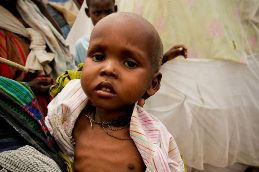 Desperate Somali mothers are abandoning their dying children by the roadside as they travel to overwhelmed emergency food centres in drought-hit eastern Africa, United Nations officials say.
Desperate Somali mothers are abandoning their dying children by the roadside as they travel to overwhelmed emergency food centres in drought-hit eastern Africa, United Nations officials say.
The UN has urged “massive” action for the drought-stricken Horn of Africa region, but charities slammed low aid pledges ahead of talks with donor countries in Nairobi this week.
Josette Sheeran, executive director of the United Nations World Food Program (WFP), told a conference in Rome that a combination of natural disaster and regional conflict was affecting more than 12 million people.
“We are seeing all the points able to distribute food completely overwhelmed,” she said, adding that a camp in Dadaab in Kenya that was built for 90,000 people now housed 400,000.
“We want to make sure the supplies are there along the road because some of them are becoming roads of death where mothers are having to abandon their children who are too weak to make it or who have died along the way.”
Women and children were among the most at risk in the crisis, Ms Sheeran said, calling it the “children’s famine” given the number of children at risk of death or permanent stunting of their brains and bodies due to hunger.
“I believe it is the children’s famine, because the ones who are the weakest are the children and those are the ones we’re seeing are the least likely to make it,” she said.
“We’ve heard of women making the horrible choice of leaving behind their weaker children to save the stronger ones or having children die in their arms.”
Ministers and senior officials met at the UN Food and Agriculture Organisation in Rome on Monday to discuss how to mobilise aid following the worst drought in decades in a region stretching from Somalia to Ethiopia, Kenya and Djibouti.
“The catastrophic situation demands massive and urgent international aid,” said Jacques Diouf, head of the UN Food and Agriculture Organisation (FAO) which hosted Monday’s emergency meeting.
“It is imperative to stop the famine” declared by the UN this month in two insurgent-held areas of southern Somalia, he said.
The WFP announced at the talks that it would begin an airlift of food aid into the Somali capital Mogadishu later today, as well as to eastern Ethiopia and northern Kenya on the border with Somalia.
An estimated 3.7 million people in Somalia – around a third of the population – are on the brink of starvation and millions more in Djibouti, Ethiopia, Kenya and Uganda have been struck by the worst drought in the region in 60 years.
The WFP will feed 2.5 million malnourished children and is trying to raise money for more. It said it needed an extra US$360 million in urgent funds. Oxfam said that overall another US$1 billion was needed to handle the situation.
The World Bank said in a statement it was providing more than $US500 million to assist drought victims, in addition to $US12 million in immediate aid to help those worst hit.
Governments worldwide and the UN have been criticised for their slow response to the severe drought, but they face severe problems getting aid to a region in the grip of a raging conflict across much of southern Somalia.
The UN has declared a famine in two regions of Somalia and warned it could spread further afield.


